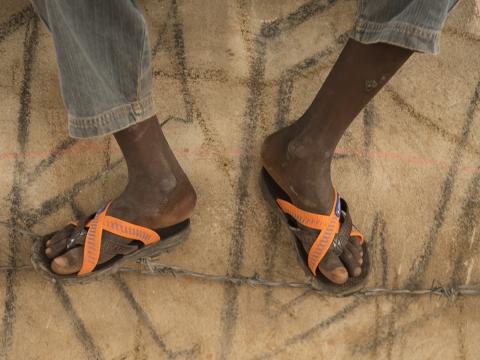Hopes raised after release of child soldiers

After making peace with South Sudan’s government, a rebel group has released 280 child soldiers to the United Nations, with plans to remove 3,000 from its ranks over the next month.
UNICEF estimates as many as 12,000 South Sudanese children have been forcefully recruited into armed groups since war broke out in December 2013.
Jackson Omona, peace building and protection advisor – WV South Sudan, said the initial release creates hope for thousands of children in South Sudan that are still being held by armed groups.
The armed groups exploit children's desperation. Often a child has lost both parents. They seek food, protection, and a place to belong.
From 2003 to 2005, Mr Omona oversaw efforts to rehabilitate about 1,500 children who had been forced into Joseph Kony’s infamous Lord’s Resistance Army. His team ran World Vision’s Children of War Center in Gulu, Uganda, which over two decades helped 15,000 children heal and reintegrate into their communities.
He offered some insights into the road ahead for the freed child soldiers.
“This conflict is incredibly complex,” Mr Omona said. “Most of these communities [that are currently fighting] have been in conflict with one another since before they became South Sudan. The law offers little protection for vulnerable people. The use of children comes on the back of cultural values that say children should protect their own communities. The conflict has created a culture of violence.”
Children end up in armed groups for various reasons. Many are kidnapped or recruited against their will to fight or serve as sex slaves. Some, Mr Omona said, may have actually chosen to join a militia. Often a child has lost both parents. They seek food, protection, and a place to belong. The armed groups exploit their desperation.
“A programme to aid former child soldiers needs to be well thought out and long-term,” he said. “When talking about a whole person, you need to address everything a person needs. They need food, counseling, to be accepted back into their community, economic development, etcetera. Child soldier rehabilitation is a very complex process.”
“A programme to aid former child soldiers needs to be well thought out and long-term,” Jackson Omona says.
Mr Omona said he wasn’t surprised by the news of the South Sudanese child soldiers being released. When this one militia struck a peace deal with South Sudan’s government, it was expected that children would be released at some point. However, the militia is only one of several that recruit and use child soldiers. A tentative peace agreement between the government and another major rebel group could lead to more child soldiers being freed.
“It gives me hope that this one step will take this country to a place where children of this conflict will feel safe in their own country,” he said. “Because for now, children don’t feel safe in their own country.”
World Vision does not currently work with former child soldiers in South Sudan. But staff members there have helped more than 500,000 people affected by the conflict, providing displaced children and families with clean water, emergency food, and household supplies; family tracing and reunification services; safe spaces for children to play, learn, and receive counseling; and livelihood assistance for longer-term stability.